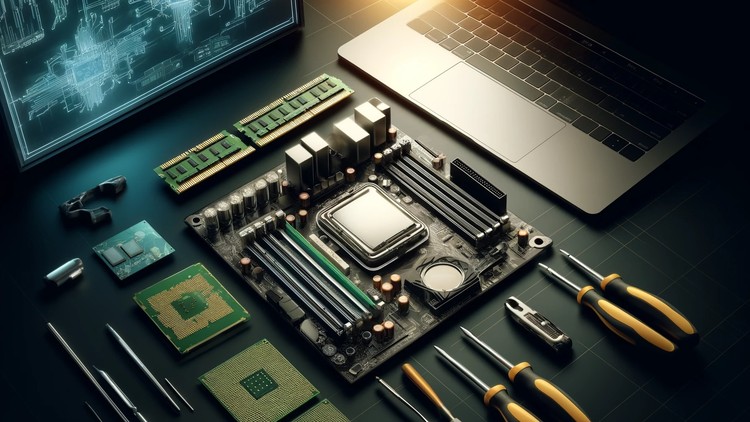
Pass the A+ Certification Core 1 Exam with confidence. Master the essentials of motherboards, CPUs, and memory.
⏱️ Length: 2.6 total hours
⭐ 4.03/5 rating
👥 13,682 students
🔄 June 2025 update
Add-On Information:
Note➛ Make sure your 𝐔𝐝𝐞𝐦𝐲 cart has only this course you're going to enroll it now, Remove all other courses from the 𝐔𝐝𝐞𝐦𝐲 cart before Enrolling!
- Course Overview
- Unlock the core secrets of PC architecture with this CompTIA A+ Mastery module, focusing on the essential roles of motherboards, processors (CPUs), and system memory (RAM). These three components are the undisputed foundation of any computer’s performance and stability.
- Delve into their critical interactions, understanding how they collaborate to process data, manage resources, and enable overall system functionality. This course offers a focused, systematic approach to mastering these hardware essentials, directly supporting your CompTIA A+ Core 1 exam preparation.
- Beyond basic identification, you’ll gain insight into component selection, optimal configuration, and the fundamental principles governing system speed and reliability. Learn to distinguish between technologies, analyze architectural choices, and build a robust knowledge base for practical IT applications.
- Requirements / Prerequisites
- A genuine interest in computer hardware and a desire to understand internal PC workings.
- Basic computer literacy is helpful, but no prior CompTIA A+ experience is required.
- No specialized equipment is mandatory for the course content, just a willingness to learn.
- Skills Covered / Tools Used
- Component Compatibility Analysis: Master evaluating hardware interoperability, ensuring seamless integration of motherboards, CPUs, and RAM for diverse system builds.
- System Assembly & Upgrade Best Practices: Develop systematic approaches for installing and connecting core components, optimizing for performance, and planning future hardware upgrades efficiently.
- Performance Troubleshooting & Bottleneck Detection: Acquire skills to identify system limitations caused by CPU, RAM, or motherboard configurations, and resolve common performance issues.
- BIOS/UEFI & Firmware Management: Learn to navigate, configure, and secure advanced firmware settings, including performing safe updates and optimizing system boot processes.
- Power-On Self-Test (POST) Diagnostics: Interpret error codes and sequences to quickly diagnose and localize boot-up failures related to core hardware components.
- Thermal Management for CPUs: Understand effective cooling strategies, including heatsink selection, thermal paste application, and airflow optimization to prevent overheating.
- Power Delivery & Connection Expertise: Grasp the intricacies of power distribution to motherboard and CPU, recognizing connector types and ensuring stable power supply.
- Conceptual Diagnostic Tool Use: Develop an understanding of how software tools like CPU-Z or MemTest86 are used for verifying specifications and testing component integrity.
- Basic Hardware Toolkit Familiarity: Familiarize yourself with essential tools such as anti-static wrist straps and screwdrivers for safe internal component handling.
- Benefits / Outcomes
- Enhanced A+ Core 1 Readiness: Solidify your understanding of crucial hardware topics, preparing you confidently for the CompTIA A+ Core 1 certification exam.
- Expert Hardware Troubleshooting: Gain the ability to precisely diagnose and resolve complex issues affecting motherboards, CPUs, and memory, boosting your technical support capabilities.
- Confident System Building & Upgrading: Make informed decisions on component selection and upgrades for optimal performance and budget efficiency in custom PC builds.
- Strong Foundation for IT Roles: Develop a robust technical foundation essential for entry-level IT support, hardware repair, and future advanced IT specializations.
- Optimized System Performance: Learn to configure and manage core hardware for improved system stability, reliability, and overall performance.
- PROS
- Highly Focused & Efficient: Delivers critical knowledge on specific hardware domains directly relevant to A+ certification in a concise timeframe.
- Practical & Exam-Oriented: Content is geared towards both real-world application and success in the CompTIA A+ Core 1 exam.
- Foundational Expertise: Provides a strong base for understanding computer architecture, vital for any IT professional.
- CONS
- Limited Direct Hands-On Time: The course’s brevity may necessitate additional self-directed practical exercises to fully internalize concepts.
Learning Tracks: English,IT & Software,IT Certifications
Found It Free? Share It Fast!